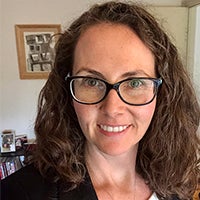
CSUN's Office of Academic Technology in collaboration with the Doctoral Program in Educational Leadership, and the Research and Sponsored Programs office, are excited to announce Autumn Fabricant as the 2021 Doctoral Student Academic Technology Equity Fellowship Recipient!
Autumn Fabricant currently teaches at CSUN in Academic First Year Experiences and the Michael D. Eisner College of Education. She will be starting CSUN’s Ed.D. program in Educational Leadership in Fall 2021. Her research interests include access and equity in higher education, a sense of belonging in college students, community-based learning, first-year students, and student success.
In reflecting on equitable access to technology, Autumn notes that “digital equity has come to the forefront this past year as universities have transitioned most instruction to online and virtual formats. Despite the currency of the issue, the digital divide has detrimentally affected student success in higher education. According to the Digital Equity in Education project at USC’s Pullias Center for Higher Education, this disproportionately impacts students from lower-income families.” As the inaugural fellow, Autumn wants to explore current research on digital equity and see how that can be applied on CSUN’s campus.
In addition to the opportunity to explore her research interests in the field, Autumn will receive a $1000 award to support her studies. Please join us in congratulating Autumn Fabricant!
"Aiming for Small, Consistent Steps Toward Digital Equity"
by Autumn Fabricant
"Since current college students grew up in the digital world, it is easy to assume that they would be proficient in academic technologies. However, this is a fallacy. Digital equity has come to the forefront this past year as universities have transitioned most instruction to online and virtual formats. Despite the currency of the issue, the digital divide has detrimentally affected student success in higher education. According to the Digital Equity in Education project at USC’s Pullias Center for Higher Education, this disproportionately impacts students from lower-income families.
I first became interested in programs that supported digital equity while working with first-generation, minoritized high school students in Michigan. The high school students shared their poetry online through the University of Michigan’s Interactive Communications & Simulations courses and connected with college students on a web-based platform. The service-learning model allowed for both the college and high school students to practice academic technologies, and in turn, helped to break down digital literacy barriers. Since then, I have also come to realize that building digital equity is a process that takes time and is best addressed in small, consistent steps.
As the recipient of the Doctoral Student Academic Technology Equity Fellowship, I look forward to raising awareness around digital equity and exploring solutions to support students, faculty, and staff, with the aim of increasing equitable actions around technology in all facets of the university. Students not only need access to hardware and technology, they also need ways to practice it. In particular, I want to explore current research on digital equity and see how that can be applied on CSUN’s campus.
My goal is to explore practices and programs that help to increase digital equity. For instance, finding ways to integrate programs similar to CSUN’s Matador Moments into course curriculum would support students in practicing academic technology. Additionally, I could see further programs being implemented in recruitment practices, new student orientation, first-year classes, or via having student technology ambassadors.
I also plan to facilitate a faculty technology workshop with the objective of raising awareness around digital equity, increasing student engagement, and connection and providing tangible ways to foster digital inclusion and support students in using technology in classes. In the summer of 2019, I attended a workshop on James M. Lang’s book, Small Teaching, which illustrates how adding small strategies can improve outcomes for students. I would like to follow a similar model, providing strategies for small changes and manageable ideas to implement that really can make a difference in student engagement and connection."
